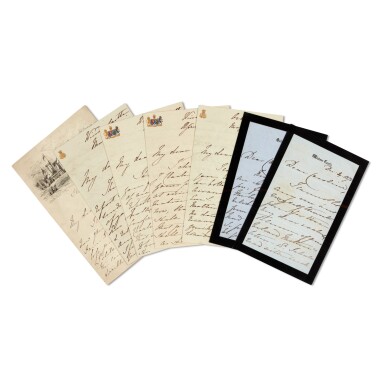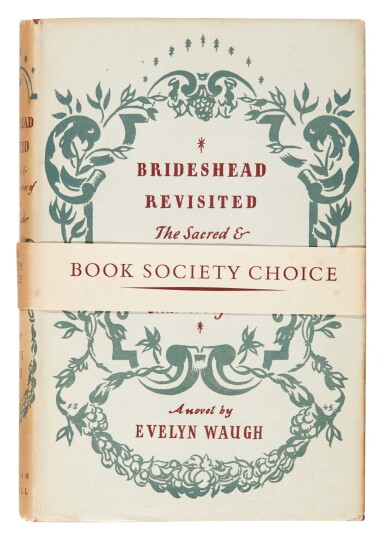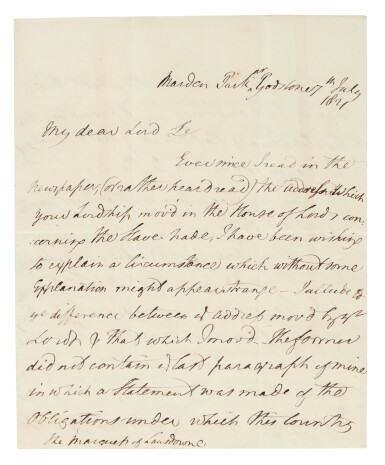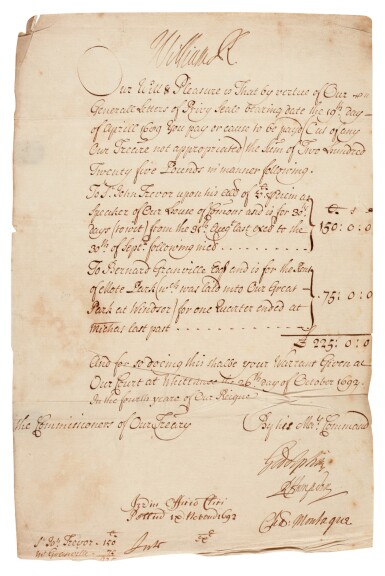DescriptionFranz Schubert
Fine lengthy autograph letter signed ("der treue aufrichtige Franz[paraph]ia"), to his brother Ferdinand, 24-25 August 1818
expressing his deep feelings for his family and for his home town Vienna, telling Ferdinand that he has completed the former's Deutsches Requiem, D.621, which has made him sad as he "sang it from the bottom of his soul", suggesting that Ferdinand write in the words and mark any repeats as he sees fit, wishing that he could bring his brother a little happiness, as he seems to be in a bad place at the moment, and joking that his stupid foot is falling asleep (which it wouldn't do if it could write); in a continuation of the letter written at 8 o'clock the following morning Schubert asks Ferdinand in return for composing the requiem for him, to extend his love to his parents, brothers and sisters, especially his youngest brother Karl, and to send him some more clothes, especially two pairs of cashmere trousers (he can pay him as he has just earned 200 florins that month), since it is already getting cold and he will not leave for Vienna until the middle of November; at the end of the letter Schubert expresses his fulsome love for Vienna, and that whilst he is looking forward to seeing the harvest and the vintage at Freistadtl (belonging to Count Erdödy, his patron's uncle), nevertheless, most of all, he cannot wait to get back to his home town, which encompasses all that he holds dear ("...So freue mich doch unendlich wieder auf den Augenblick, wo es heißen wird: Wien, nach Wien! Ja, geliebtes Wien, Du schließt das Theuerste, das Liebste, in Deinen engen Raum, und nur Wiedersehen himmlisches Wiedersehen wird diese Sehnen stillen...")
...Es ist Nachts halb 12 Uhr, und fertig ist deine Trauermesse. Traurig machte sie mich, glaub es mir, denn ich sang sie aus voller Seele. Was dran fehlt, ergänze, d.i. schreibe den Text drunter u. die Zeichen drüber. Willst Du manches repetiren, so thu es, ohne mich in Zeliz darum zu fragen. Dir geht es nicht gut, ich wollt, ich könnte mit Dir tauschen, so wärst Du einmahl froh. Jede drückende Last würdest Du abgeworfen finden. Lieber Bruder, ich wünscht’ es Dir vom Herzen--Mein Fuß schläft mir ein, u. ich bin darüber sehr böse. Konnte der Talk schreiben, würde er nicht schlafen.-- -- -- -- -- -- Guten Morgen, Brüderchen, ich hab nun sammt dem Fuß geschlafen und setze meinen Brief den 25 um 8 Uhr fort...
4 pages, oblong 4to (c.20 x 24.5cm), on "Konzeptpapier", pencil annotation at head ("92"), collector's paper wrapper (numbered "92" and "163"), Zseliz (Zeliezovce), 24-25 August 1818, some creasing and light dust-marking to folds on the fourth page
A SUPERB LETTER DATING FROM THE TIME OF SCHUBERT'S FIRST ACQUAINTANCE WITH HIS LATER MUSE CAROLINE ESTERHÁZY.
Schubert's autograph letters are by far the rarest of the great composers of the Viennese Classical Era. While there are roughly four hundred letters and diaries by Haydn, six hundred letters by Mozart and sixteen hundred by Beethoven, only about sixty by Schubert are known to survive, mostly in museums. This letter is only one of two to have been offered at auction here in the last seventeen years (the other being the celebrated last letter of Schubert, sold in these rooms on 8 June 2021, lot 55).
In July 1818, Schubert travelled one hundred miles east to the Hungarian town of Zseliz (now Želiezovce in Slovakia), at the invitation of Count Johann Karl Esterházy of Galánta, to teach his teenage daughters, the 16-year-old Maria and 12-year-old Caroline. It seems that for the latter Schubert grew to entertain deep feelings: she became in fact over time something of a muse for the composer, and it was for her that he wrote in the closing year of his life (1828) the sublime Fantasy in F minor for piano duet, D.940. Among the other works that Schubert composed during his sojourn in Zseliz are the famous March Militaire in D for piano duet, op.51 (D.733 no.1), the piano duet sonata in B-flat, op.30 (D. 617), and the songs "Das Abendroth" (D.627), "Einsamkeit" (D.600) and "Blonde zu Marien" (D.626).
The Deutsches Requiem referred to in the letter is work that the composer wrote for his brother Ferdinand (a modest composer in his own right), who then passed it off as his own composition in order to further his career and to pass exams. He had the work performed at the chapel of the Vienna orphanage in September 1818, and it was even published by Diabelli as Ferdinand's "opus 2" in 1826. However, this letter makes it clear that Ferdinand's famous brother Franz was in fact the composer (the autograph is in fact lost). In a subsequent letter to Ferdinand, Schubert begs him not to apologise for appropriating his work ("...so my German Requiem pleased you, and you cried over it, perhaps at the very word over which I wept myself...[letter dated 29 October 1818: translation]").
LITERATURE:The letter, then still owned by Ferdinand's descendants in Vienna, was first published by Sir George Grove in his article 'Schubert' in A Dictionary of Music and Musicians, III (1883), p.330; G. Kinsky, Manuskripte-Briefe-Dokumente von Scarlatti bis Stravinsky (1953), no.163; O.E. Deutsch, Schubert. A Documentary Biography (1946), no.131 (pp.94-97); Elizabeth Norman McKay, Franz Schubert: a biography (Oxford, 1996), pp.222-225; Franz Schubert, Briefe, Tagebuchnotizen, Gedichte, edited by Erich Valentin (1997), pp.40-42
PROVENANCE:Caroline Geisler-Schubert (1856-1951); Maggs Bros., Autograph letters, Historical Documents and Authors' Original Manuscripts, catalogue no.449 (1924), item 380 (illustrated) Condition reportCondition is described in the main body of the catalogue where appropriate
Please note that Condition 12 of the Conditions of Business for Buyers (Online Only) is not applicable to this lot.
The lot is sold in the condition it is in at the time of sale. The condition report is provided to assist you with assessing the condition of the lot and is for guidance only. Any reference to condition in the condition report for the lot does not amount to a full description of condition. The images of the lot form part of the condition report for the lot. Certain images of the lot provided online may not accurately reflect the actual condition of the lot. In particular, the online images may represent colors and shades which are different to the lot's actual color and shades. The condition report for the lot may make reference to particular imperfections of the lot but you should note that the lot may have other faults not expressly referred to in the condition report for the lot or shown in the online images of the lot. The condition report may not refer to all faults, restoration, alteration or adaptation. The condition report is a statement of opinion only. For that reason, the condition report is not an alternative to taking your own professional advice regarding the condition of the lot. NOTWITHSTANDING THIS ONLINE CONDITION REPORT OR ANY DISCUSSIONS CONCERNING A LOT, ALL LOTS ARE OFFERED AND SOLD "AS IS" IN ACCORDANCE WITH THE CONDITIONS OF SALE/BUSINESS APPLICABLE TO THE RESPECTIVE SALE.
DescriptionFranz Schubert
Fine lengthy autograph letter signed ("der treue aufrichtige Franz[paraph]ia"), to his brother Ferdinand, 24-25 August 1818
expressing his deep feelings for his family and for his home town Vienna, telling Ferdinand that he has completed the former's Deutsches Requiem, D.621, which has made him sad as he "sang it from the bottom of his soul", suggesting that Ferdinand write in the words and mark any repeats as he sees fit, wishing that he could bring his brother a little happiness, as he seems to be in a bad place at the moment, and joking that his stupid foot is falling asleep (which it wouldn't do if it could write); in a continuation of the letter written at 8 o'clock the following morning Schubert asks Ferdinand in return for composing the requiem for him, to extend his love to his parents, brothers and sisters, especially his youngest brother Karl, and to send him some more clothes, especially two pairs of cashmere trousers (he can pay him as he has just earned 200 florins that month), since it is already getting cold and he will not leave for Vienna until the middle of November; at the end of the letter Schubert expresses his fulsome love for Vienna, and that whilst he is looking forward to seeing the harvest and the vintage at Freistadtl (belonging to Count Erdödy, his patron's uncle), nevertheless, most of all, he cannot wait to get back to his home town, which encompasses all that he holds dear ("...So freue mich doch unendlich wieder auf den Augenblick, wo es heißen wird: Wien, nach Wien! Ja, geliebtes Wien, Du schließt das Theuerste, das Liebste, in Deinen engen Raum, und nur Wiedersehen himmlisches Wiedersehen wird diese Sehnen stillen...")
...Es ist Nachts halb 12 Uhr, und fertig ist deine Trauermesse. Traurig machte sie mich, glaub es mir, denn ich sang sie aus voller Seele. Was dran fehlt, ergänze, d.i. schreibe den Text drunter u. die Zeichen drüber. Willst Du manches repetiren, so thu es, ohne mich in Zeliz darum zu fragen. Dir geht es nicht gut, ich wollt, ich könnte mit Dir tauschen, so wärst Du einmahl froh. Jede drückende Last würdest Du abgeworfen finden. Lieber Bruder, ich wünscht’ es Dir vom Herzen--Mein Fuß schläft mir ein, u. ich bin darüber sehr böse. Konnte der Talk schreiben, würde er nicht schlafen.-- -- -- -- -- -- Guten Morgen, Brüderchen, ich hab nun sammt dem Fuß geschlafen und setze meinen Brief den 25 um 8 Uhr fort...
4 pages, oblong 4to (c.20 x 24.5cm), on "Konzeptpapier", pencil annotation at head ("92"), collector's paper wrapper (numbered "92" and "163"), Zseliz (Zeliezovce), 24-25 August 1818, some creasing and light dust-marking to folds on the fourth page
A SUPERB LETTER DATING FROM THE TIME OF SCHUBERT'S FIRST ACQUAINTANCE WITH HIS LATER MUSE CAROLINE ESTERHÁZY.
Schubert's autograph letters are by far the rarest of the great composers of the Viennese Classical Era. While there are roughly four hundred letters and diaries by Haydn, six hundred letters by Mozart and sixteen hundred by Beethoven, only about sixty by Schubert are known to survive, mostly in museums. This letter is only one of two to have been offered at auction here in the last seventeen years (the other being the celebrated last letter of Schubert, sold in these rooms on 8 June 2021, lot 55).
In July 1818, Schubert travelled one hundred miles east to the Hungarian town of Zseliz (now Želiezovce in Slovakia), at the invitation of Count Johann Karl Esterházy of Galánta, to teach his teenage daughters, the 16-year-old Maria and 12-year-old Caroline. It seems that for the latter Schubert grew to entertain deep feelings: she became in fact over time something of a muse for the composer, and it was for her that he wrote in the closing year of his life (1828) the sublime Fantasy in F minor for piano duet, D.940. Among the other works that Schubert composed during his sojourn in Zseliz are the famous March Militaire in D for piano duet, op.51 (D.733 no.1), the piano duet sonata in B-flat, op.30 (D. 617), and the songs "Das Abendroth" (D.627), "Einsamkeit" (D.600) and "Blonde zu Marien" (D.626).
The Deutsches Requiem referred to in the letter is work that the composer wrote for his brother Ferdinand (a modest composer in his own right), who then passed it off as his own composition in order to further his career and to pass exams. He had the work performed at the chapel of the Vienna orphanage in September 1818, and it was even published by Diabelli as Ferdinand's "opus 2" in 1826. However, this letter makes it clear that Ferdinand's famous brother Franz was in fact the composer (the autograph is in fact lost). In a subsequent letter to Ferdinand, Schubert begs him not to apologise for appropriating his work ("...so my German Requiem pleased you, and you cried over it, perhaps at the very word over which I wept myself...[letter dated 29 October 1818: translation]").
LITERATURE:The letter, then still owned by Ferdinand's descendants in Vienna, was first published by Sir George Grove in his article 'Schubert' in A Dictionary of Music and Musicians, III (1883), p.330; G. Kinsky, Manuskripte-Briefe-Dokumente von Scarlatti bis Stravinsky (1953), no.163; O.E. Deutsch, Schubert. A Documentary Biography (1946), no.131 (pp.94-97); Elizabeth Norman McKay, Franz Schubert: a biography (Oxford, 1996), pp.222-225; Franz Schubert, Briefe, Tagebuchnotizen, Gedichte, edited by Erich Valentin (1997), pp.40-42
PROVENANCE:Caroline Geisler-Schubert (1856-1951); Maggs Bros., Autograph letters, Historical Documents and Authors' Original Manuscripts, catalogue no.449 (1924), item 380 (illustrated) Condition reportCondition is described in the main body of the catalogue where appropriate
Please note that Condition 12 of the Conditions of Business for Buyers (Online Only) is not applicable to this lot.
The lot is sold in the condition it is in at the time of sale. The condition report is provided to assist you with assessing the condition of the lot and is for guidance only. Any reference to condition in the condition report for the lot does not amount to a full description of condition. The images of the lot form part of the condition report for the lot. Certain images of the lot provided online may not accurately reflect the actual condition of the lot. In particular, the online images may represent colors and shades which are different to the lot's actual color and shades. The condition report for the lot may make reference to particular imperfections of the lot but you should note that the lot may have other faults not expressly referred to in the condition report for the lot or shown in the online images of the lot. The condition report may not refer to all faults, restoration, alteration or adaptation. The condition report is a statement of opinion only. For that reason, the condition report is not an alternative to taking your own professional advice regarding the condition of the lot. NOTWITHSTANDING THIS ONLINE CONDITION REPORT OR ANY DISCUSSIONS CONCERNING A LOT, ALL LOTS ARE OFFERED AND SOLD "AS IS" IN ACCORDANCE WITH THE CONDITIONS OF SALE/BUSINESS APPLICABLE TO THE RESPECTIVE SALE.















Testen Sie LotSearch und seine Premium-Features 7 Tage - ohne Kosten!
Lassen Sie sich automatisch über neue Objekte in kommenden Auktionen benachrichtigen.
Suchauftrag anlegen